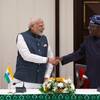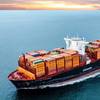Global Marine's Summary of Current Offshore Rig Economics (SCORE) for December 1999 increased 3.5 percent from a month earlier, with significant improvement of the rig markets in the Gulf of Mexico and West Africa, Chairman, President and CEO Robert Rose announced at a press conference.
Global Marine's SCORE provides a single statistic for determining the health of the offshore drilling industry. It compares the profitability of current mobile offshore drilling rig rates to the profitability of rates at the 1980-81 peak of the offshore drilling cycle, when speculative new rig construction was common. In the 1980-81 period ? when Global Marine's SCORE averaged 100 percent ? new-contract dayrates equaled the sum of daily cash operating costs plus approximately $700 per day per million dollars invested.
The December worldwide SCORE for all types of offshore drilling rigs increased 3.5 percent to 24.9 percent from 24 percent in November. The December 1999 SCORE is a 50.9 percent decrease from December 1998 and a 32.5 percent decrease from the same period five years ago.
The U.S. Gulf of Mexico SCORE was up 6.4 percent over November 1999, the sixth consecutive month of improvement for that region. The West Africa number increased 7.4 percent from the previous month.
Although the worldwide SCORE has decreased since last year, Rose remains optimistic about its implications. "Improving rig markets in West Africa and the U.S. Gulf of Mexico more than offset continued weakness in the North Sea," he said. "During the winter months, rig demand in the North Sea is traditionally weak as operators are reluctant to begin drilling programs during the harsh winter weather. While the North Sea market may or may not remain soft during 2000, activity there has historically picked up as summer approaches."
The first sign of recovery in the offshore drilling sector occurred in July 1999, when SCORE began improving as oil prices slowly rebounded. The Gulf of Mexico saw the quickest recovery, and that market, as well as West Africa, continues to recover. Although recovery in the North Sea may or may not be imminent, Rose said offshore Brazil will see increased activity.
The industry continues its focus on deepwater, said Rose, noting five deepwater drillships and four semisubmersibles were introduced to the worldwide fleet in 1999.
Rose said the company expects this year to mark more improvement for the industry, and said this year is the first time in more than a decade stability is possible.
"We are now in a time where supply and demand are at equilibrium, so it almost doesn't matter what OPEC does," he said.
The positive atmosphere will continue, said Rose, as long as oil prices remain between $17 and $21. If prices stay in that range, he said, the industry will see increasing capital expenditures by oil production companies.
"The higher prices stay, the more active we become," Rose said, adding that 2000 will also see increased activity by the newly merged supermajors that have spent the past year rationalizing and finalizing mergers. "These companies have been paralyzed," Rose said. "They have not been thinking about drilling holes in the ground. This year these companies will come back into the game."
Additionally, he said, the major companies will be looking to sell properties they no longer need, which will create a positive environment for the independent companies, who are usually aggressive regarding acquisitions.
Subscribe for
Maritime Reporter E-News
Maritime Reporter E-News is the maritime industry's largest circulation and most authoritative ENews Service, delivered to your Email five times per week









